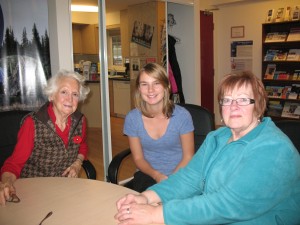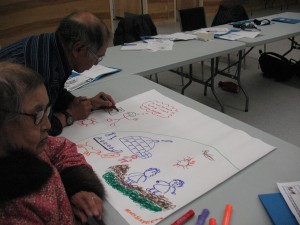- Details
- Published: 13 November 2014
 Interview with Barb Hood, Executive Director and Carly Aasen, Director
Interview with Barb Hood, Executive Director and Carly Aasen, Director
NWT Seniors Society
CNPEA: How does your project prevent abuse of older adults?
The emphasis of this project is including the whole community in preventing abuse of older adults. We have led 14 Creating Safe Community workshops with elders, service providers, youth, RCMP and others to build action plans that are community specific. During the first day of the two-day workshops we first identify what abuse looks like in their communities—this is important because it can look really different in each community. On day two of the workshop we develop action plans to address these issues. We believe this process is helpful because while people often are aware of abuse, they may not know how to address it.
12 Intergenerational Connections projects were supported through Leading the Way. Initiatives ranged from Grandmother Walks in Fort Good Hope to elders visiting the preschool in Tulita—but all involved interactions between older adults and youth. For example, during the grandmother walks older women would walk with grandchildren and teach them about the plants and how to harvest them to use for traditional purposes. Summaries of each initiative are being compiled into an Intergenerational Handbook for distribution around the territory.
 The NWT Seniors’ Society has also made an effort to support research related to older adults’, including a comparative research study on older adult abuse. This is huge for the North—the first comparative research study of this nature to have ever happened.
The NWT Seniors’ Society has also made an effort to support research related to older adults’, including a comparative research study on older adult abuse. This is huge for the North—the first comparative research study of this nature to have ever happened.
CNPEA: How does your project engage rural and remote practitioners? Do you have any promising tips you could share?
Often resources developed in the south are not transferable to a northern context. The Neighbours, Friends and Families project created specific videos relevant to the north, helping to provide engaging materials for service providers here. Overall, we have found that service providers are really interested in training as long as it is relevant and considerate of the language and culture of their community.
We have teamed up with other not-for-profit organizations and the Health and Social Services Department to help fund and deliver workshops to ensure older adults’ issues are represented and discussed. We have also done some training with nurses and social work students at the local college. In terms of engaging and maintain relationships, we find is it is best to work with the service providers that are already advocates in their community and provide them with any information or resources they require and we have available. Regular follow-up and consistent contact is important, because the rate of practitioner-turnover is relatively high in smaller northern communities.
CNPEA: What part of this project are you most proud of?
The relationships that have been created and the creditability this project has brought to the NWT Seniors’ Society. People are becoming more aware of us and trust our work. As more people learn about us, our Seniors’ Information Line is accessed and promoted in 33 distinct communities. The project itself is driven and guided by older adults. We are also proud of our research projects which have engaged over 500 adults and 100 service providers.
CNPEA: How do you plan to sustain this project?
We have a conference scheduled in the new year with the goal of discussing sustainability. We plan to bring together people who have been engaged in the project and other key players who care about the health and well-being of older adults to have a conversation about how we can move forward with limited funding. The results of our comparative research project will be presented during this conference. It is predicted that this study will give us a good idea of the current realities regarding elder abuse and potential next steps in moving forward. We hope our Strategy to Address Abuse of Older Adults in the NWT is adopted by legislature.
 More information on the Leading the Way—Networking to Prevent Abuse of Older Adults project can be found on the NWT Seniors Society website or the website of the NWT Network to Prevent Abuse of Older Adults.
More information on the Leading the Way—Networking to Prevent Abuse of Older Adults project can be found on the NWT Seniors Society website or the website of the NWT Network to Prevent Abuse of Older Adults.
















